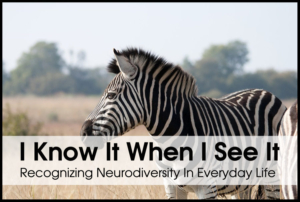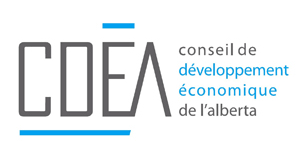What is Neurodivergency?
 Normalizing Neurodivergence
Normalizing Neurodivergence
The term “neurodivergent” is an umbrella term that encompasses a range of neurodevelopmental conditions and variations in cognitive functioning. It is used to describe individuals whose neurological development and functioning differ from what is considered typical or “neurotypical”.
Here’s a closer look at the concept of neurodivergence: While autism and ADHD are commonly associated with neurodivergence, the term is intentionally broader. It includes individuals who may not fit neatly into specific diagnostic categories but still experience neurocognitive differences, recognizing that diverse ways of thinking and processing information exist. Neurodivergent individuals may include those with conditions such as autism spectrum disorder (ASD), attention-deficit/hyperactivity disorder (ADHD), dyslexia, dyspraxia, Tourette syndrome, Bipolar disorder, and many others. It acknowledges the diversity of neurological conditions and variations. The term challenges the notion of a normal or neurotypical standard. It emphasizes that neurological differences are not deviations from a norm but represent natural variations in human neurodiversity.
Neurodivergence recognizes that each person’s cognitive and neurological profile is unique. It celebrates the richness of diverse perspectives, cognitive styles, and ways of experiencing the world.
Recognizing and accommodating divergency in learning styles is essential for creating inclusive and effective educational environments. It promotes a holistic understanding of learners and encourages the development of strategies that cater to the varied needs and preferences of individuals.
In summary, the nature of divergence, particularly in terms of divergent thinking, aligns with the recognition of cognitive diversity. Understanding and appreciating different learning styles can enhance educational practices by catering to the varied ways individuals approach learning and problem-solving. This inclusive approach contributes to a more dynamic and effective learning experience.

Entrepreneurial Success: A Zebra vs. Horse Mindset
Embracing a Zebra vs. Horse mindset can be a transformative approach for entrepreneurs seeking success in the dynamic and competitive business landscape. This mindset emphasizes the value of neurodiversity, creativity, and unique perspectives, offering entrepreneurs a fresh perspective on innovation, problem-solving, and team dynamics.
For these reasons, the Zebra Entrepreneur often brings the following qualities to their business:
Innovation through Diversity: Entrepreneurial success often hinges on innovation. A Zebra vs. Horse mindset encourages entrepreneurs to assemble diverse teams with individuals possessing varied cognitive profiles. Just as zebras’ unique stripes contribute to their survival, diverse perspectives foster creativity, leading to innovative solutions that set businesses apart in the market.
Adaptive Problem-Solving: The business world is rife with challenges and uncertainties. Adopting a Zebra vs. Horse mindset equips entrepreneurs with an adaptive problem-solving approach. Neurodivergent individuals, with their distinctive cognitive “stripes,” may offer unconventional solutions and approaches that can be invaluable in navigating complex issues.
Cultivating a Positive Work Culture: Building and sustaining a positive work culture is crucial for entrepreneurial success. Recognizing and celebrating the cognitive diversity within a team fosters a supportive and inclusive environment. Entrepreneurs can leverage this mindset to create workplaces where individuals feel valued for their unique strengths and contributions.
Customer-Centric Innovation: Understanding and embracing neurodiversity can lead to more customer-centric innovation. A Zebra vs. Horse mindset prompts entrepreneurs to consider the diverse needs and preferences of their customer base. By tapping into varied perspectives, businesses can tailor products and services to a broader audience.
Effective Leadership Communication: Entrepreneurs who adopt a Zebra vs. Horse mindset are better equipped to communicate effectively with a diverse team. This approach emphasizes the importance of clarity, empathy, and flexibility in leadership. Entrepreneurs can adapt their communication styles to resonate with the diverse ways team members process information.
Creating Inclusive Products and Services: A Zebra vs. Horse mindset extends beyond internal team dynamics to product and service development. By appreciating cognitive diversity, entrepreneurs can create offerings that cater to a broader market. Inclusivity becomes a driving force behind product design, ensuring that the business serves the needs of a diverse customer base.
Building Resilient Teams: Entrepreneurial journeys are often marked by challenges and setbacks. Teams with a Zebra vs. Horse mindset tend to be more resilient. Diverse perspectives contribute to a robust and adaptable team that can navigate obstacles with creativity and determination.
Strategic Recruitment and Partnerships: Entrepreneurs can strategically recruit individuals with diverse cognitive strengths and form partnerships that leverage neurodivergent talent. This intentional approach to team-building and collaboration can lead to unique synergies and competitive advantages.
Finding entrepreneurial success with a Zebra vs. Horse mindset involves embracing and leveraging cognitive diversity for innovation, adaptability, and inclusive business practices. Entrepreneurs who recognize the value of neurodiversity can position their businesses to thrive in an ever-evolving market while fostering positive workplace cultures that attract top talent.



